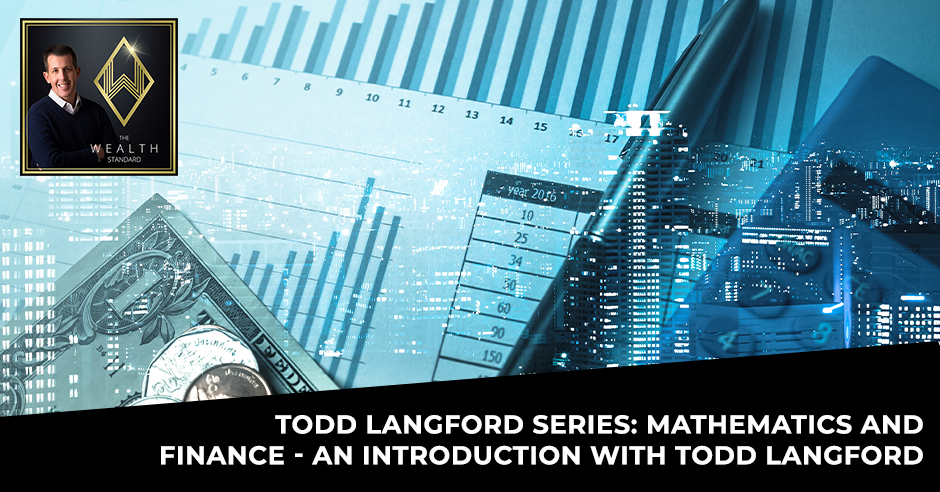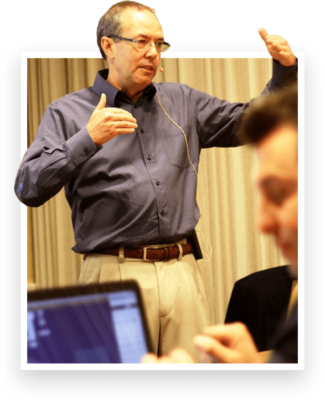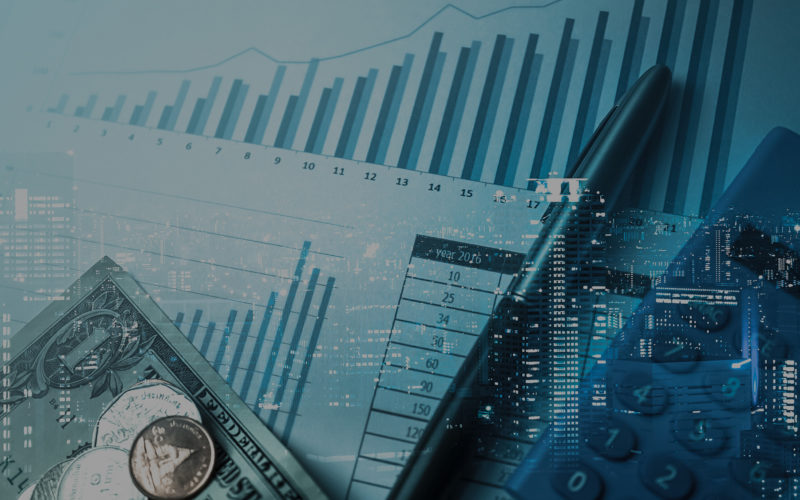Todd Langford Series: Mathematics And Finance – An Introduction With Todd Langford

A quote by the Mathematical Association of America says, “It’s time for all members of our profession to acknowledge that mathematics is created by humans and therefore inherently carries human biases.” This intriguing statement makes us think what math is and its role in general. To help us answer these questions, Patrick Donohoe brings on Todd Langford in a series of episodes that revolve around the principles of math and how math specifically relates to finance. Todd is one of Patrick’s original mentors and the CEO and Founder at Numbers Analytic, Inc. Today, they discuss why most of the significant innovations resulted from accidents and also touch on the importance of mathematics and curiosity.
—
Watch the episode here:
Listen to the podcast here:
Todd Langford Series: Mathematics And Finance – An Introduction With Todd Langford
I’m going to introduce a series that’s going to begin. It’s going to be an episode per week. Short episode but it’s a snippet of a couple of long interviews that I did. Let me introduce the topic, subject and why. I came across a quote that led me down one of these philosophical paths. I had lots of breakthroughs and understandings of certain fundamental, simple things. I wanted to express that with you and expand upon it in a number of episodes. Who knows how long it will go for? I want you to understand the quote, at the same time, it led me to understand other things. The quote is by the Mathematical Association of America.
It said, “It’s time for all members of our profession to acknowledge that mathematics is created by humans and therefore inherently carries human biases.” It’s an interesting quote. I’ve stepped back and caused me to think about what math is. Did humans create it? Does math carry biases? It’s an intriguing statement. I’m going to unpack it in a sense. As I began exploring, I found out number one, there’s been this debate going on for quite some time between two camps. The intuitionist camp says that the human mind created math. There’s another camp called the Platonists who argue that math was a discovery of the human mind. I was reading and understanding both points of view. I realized that in the end, I’m not sure if it matters that much.
Most of the significant breakthroughs came from accidents. Click To TweetIt caused me to question what the role of mathematics is in general. I wanted to explore it at a more practical level. What did it have to do with my life? What would it have to do with my profession? What would it have to do with anyone else’s life? Some of the conclusions are math is a more objective way to evaluate a hypothesis or an assumption. Some simple examples, this comes down to the scientific revolution being able to prove and understand what goes on below the surface. What I mean by that is a surface observation or an assumption we can make is maybe based on how a child looks outside and sees the sun rising in the East and then going West, and it sees it again. You can reason the sun revolves around the Earth.
You can see how these surface observations can lead to faulty assumptions. I was on a hike with two of my kids, my youngest son and my fourteen-year-old. We got up to this peak, it’s on the East side of Salt Lake City. It was an amazingly clear day. You can see all the way across to the other side of the great Salt Lake. I thought of there, I can see why someone would assume that the Earth was flat. These general surface observations have been disproven. Science has disproven it because there was an assumption made. A person wanted to test that assumption and realized that it was false. Those are simple examples. That trend has gone on for quite some time and it’s led to an insane science of revolution and the miraculous life we get to live now.
I look at math more objectively, I’m not going to say pure objectively with regards to math but more objectively, testing out an assumption or hypothesis. That’s where I realized I’m going to get down to some basic truths. This is what I came across. I’ve come across this a couple of times, this thinking model called First Principles. Elon Musk credits this way of thinking as to why he’s so successful with Tesla, PayPal, SpaceX, SolarCity, you list all the companies. He says that he finds opportunities using the First Principles thinking methods. Let me unpack that and relate it to the mission of the show. This thinking model, first principles, predated Musk. This was something that was maybe born during Aristotle’s times. It was used by Copernicus, one of the most famous physicists of our modern time, Richard Feynman, who’s deceased. His way of thinking, his books, you can see it there when you understand first principles. He also used it to understand the core of something.

Mathematics And Finance: People don’t want retirement; they want to be independent.
What is first principles? First principles essentially boils down a problem or an idea or assumption to the fundamental truth. From that fundamental foundational level, you reason up from there. Musk says that the way in which most people think is reasoning or thinking by analogy. How he describes that is people copy what other people are doing, and then they try do it with slight variation. They look at the activity, the solution something that other people are doing to solve a problem and make slight variations and tweaks to that. First principles goes to that deeper level. Instead of assuming the truth of the world is flat, you go to the deeper level to understand what is that fundamental core truth. Going back to the mission of the show, I’ve made a claim in the book I wrote in 2018. It’s also the purpose of the show and reasons why I have certain guests on is because I have the assumption that people want to achieve a meaningful life.
I also have an assumption that people want to be financially independent. That’s the mission of the show, to empower people to those ends. It caused me to think. I realized something that, to me, this idea wasn’t born using this rational line of thinking. The financial services industry specifically financial planning, retirement planning is a multi-trillion industry, finance, personal development. Achieving these ends of financial independence and a meaningful life, I don’t believe that they’re wanting to achieve. I believe that these financial industries are pushing for this end result of retirement and being successful with the way in which you manage money until that point in time. This goes to thinking by analogy. I don’t believe that retirement is what people want. They’re solving for retirement. This comes from experience working with people as a financial advisor. They don’t want retirement. They want to be independent.
They don’t want to necessarily work in something they don’t like. That’s why they want to retire. They also would rather do other things than work all the time, which is why they want to retire. Financial independence is possible sooner than 65. It’s pushing this date out to 65 years old. I don’t believe that’s necessary anymore. I don’t even believe it was ever necessary. If you have this end result and you have this entire system designed around this end result, right then that narrative is going to continue and new entries into the system are essentially going to think by analogy and try to make improvements. Maybe it’s the mutual fund, the ETF or the asset allocation model. It’s still to the same end result but there are slight variations to it. I want you to you to consider that as a possibility of why you are managing your money. What’s the purpose? Why are you investing? Boil it down to the fundamental truth. What will that give you that you don’t have now? What problem will it solve?
Once you can get clear about those end results, then you try to remove the constraints between where you are and where you want to go. What does this have to do with math? If math is a better way to evaluate rather than just by observation or by copying what somebody is doing and making a slight variation to it, it’s the measure of the evaluation of these assumptions. If you go to financial planning, investment planning, there are these surface level assumptions that are being made about rates of return, income, purchasing power, taxation. There are a number of things as far as assumptions being made in the financial services industry. I looked at have those claims been properly evaluated. This where I’m going to move to as far as this series is concerned. I am going to have on as a guest of mine, a man that was one of my original mentors, Todd Langford. He’s the developer of financial strategy, financial advising, financial planning software. He’s been doing that for many years on multiple systems and platforms. In general, he’s a good man. Also, he’s curious about life and an engineer at heart, wanting to know how things work, the truth behind how things function. Because of that, he’s done some pretty crazy, bizarre things.
Ignorance in a particular field or idea allows you the ability to learn more. Click To TweetHe has these crazy multistage fireworks display and this big ranch that him and his wife, Kim, live on. He’s programmed this metal 3D printer laser cutters from his phone. Everything in his home, he has managed, programmed and automated. He built this massive solar complex that powers not just his house but other houses. He built the structure behind it, how the batteries worked and how the solar panels would be facing and the pitch of the roof. He’s a brilliant man. He understands the principles of math specifically how math relates to finance. To be able to evaluate at a more objective level the claims made about what money should be doing both the end result but also the methods to get to those end results. I hope you enjoy this series. The series will go on for most likely several weeks, several months. Who knows? Thanks for tuning in. I appreciate the support. We have some new stuff coming out, some tools that relate to this subject. Make sure you bookmark the website and also look out for some emails coming from us. Take care.
—
Todd, first question I have for you is our relationship. You’ve always been a curious person. What’s the driving force behind that curiosity? How would you characterize that?
I always like to see a different way of doing something. Kim relates it to my code and the way that fits in. Sometimes, one direction of answer. I may not like the answer that I get, so I try to attack it in another way to see if those two come up the same. Where that differential is drives the idea somewhat of efficiencies. It’s pretty easy to get into a rut of, “This is the way it’s always been done.” In order to keep me from getting into that road of this is the way it’s always been done, I tend to try to do it a different way.
What do you discover in the process? Let’s say you find that it’s been done this way. That way is inefficient, inaccurate, it could be done a better way. What happens in the experience of that discovery?

Mathematics And Finance: When you don’t like the answer you get, try to attack it in another way to see if those two come up the same.
Often, ignorance in a particular field or idea allows you the ability to learn more. It allows you to innovate a lot easier because you’re not smart enough to be on the path of what somebody’s already discovered. If you look at history on innovation, most of the significant breakthroughs came from an accident. The reason they came from an accident is because the tried-and-true way that everybody had always done something was limited on how far it could go. When they made a mistake, they figured out it’s not that what we were doing is wrong. It’s that our thought process was off base. We have to shift our mind and thinking into a place. It’s difficult to get out of the box that you’ve created for the way things have always been.
Since those accidents occur from the outside, I find myself a lot of times seeing things that you’ve always heard were true but maybe they’re not. When you dig pretty deeply on things, you find that the label professional has an interesting connotation. These are mainly the people that are considered professionals. They’re supposed to be the ones that know it all but a lot of times you find out it’s just that they know a little bit more than everybody else does. If you dig a little bit deeper, sometimes you find out maybe they don’t know everything that’s there. I found some of that out. You mentioned about the solar project. As I was going through some of the solar stuff, I would come up against people, I would question them like, “Can I do this?” They said, “That won’t work.” I would back it up and say, “Here’s the math. Follow me with the math behind what we’re talking about doing.” They’d look at it and there’d be this pause. I was like, “That could work.” The only way I could find that was doing it because nobody would give me a definitive answer.
Important links:
About Todd Langford
 Todd Langford is the Founder & CEO of Truth Concepts, Partners 4 Prosperity, and Prosperity Economics Advisors.
Todd Langford is the Founder & CEO of Truth Concepts, Partners 4 Prosperity, and Prosperity Economics Advisors.
Love the show? Subscribe, rate, review, and share!




















